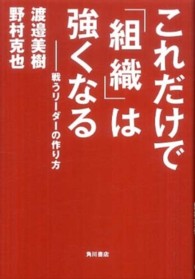Full Description
Bertram Windle was a doctor, a scientist, an archaeologist, an anthropologist, a writer on English literature and evolution, and President of Queen's/University College Cork. During his time in Ireland between 1904 and 1919, he had a major impact on the development of higher education and the development of the National University of Ireland. Windle was a privileged participant in Irish public affairs with friends in the British Government, Dublin Castle, the Irish Parliamentary Party, the Gaelic League and the Catholic Church. The son of a Church of Ireland rector, he studied medicine at Trinity College Dublin. A convert to Catholicism in the early 1880s, he became a Professor of Anatomy in Birmingham, helping to found Birmingham University. He took up his post as President of Queen's College Cork in 1904, transforming the university during the following decade and a half into a modern institution with an enhanced curriculum, more staff, a growing student body and new buildings and facilities. He was responsible for the building of the Honan Hostel and Honan chapel. Windle viewed with great concern the rise of radical nationalism and the growth of Sinn Fein.
He was a strong supporter of the British government's participation in World War 1, a critic of the 1916 rising, and a member of the Irish Convention which sought to resolve the 'Irish question' in 1917/1918. Windle had no sympathy for the new radical nationalist coalition which contested the general election of 1918. In the context of the decline of the Irish Parliamentary Party and the rise of Sinn Fein led by Eamon de Valera, he launched his second unsuccessful bid to establish an autonomous university of Munster. Thwarted by a combination of nationalist intransigence and the weakness of the British government, he left Ireland for Canada in 1919 thoroughly disillusioned by the politics of UCC, the Irish Catholic Church and the emerging independent Irish state. Students of Irish history, politics, culture, society and education will find the work of interest together with those who wish to see Windle in his role as a scientist and commentator on evolution and on religious matters. Windle, given his background and formation, provides a unique view of Irish politics, history and education.
The work is all the more important because of the richness primary sources on which it is based







